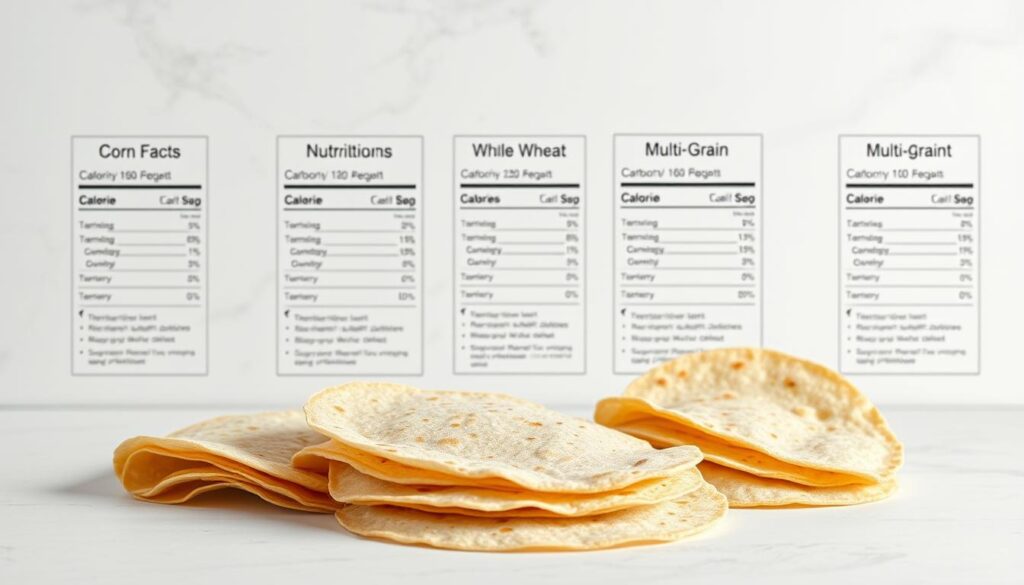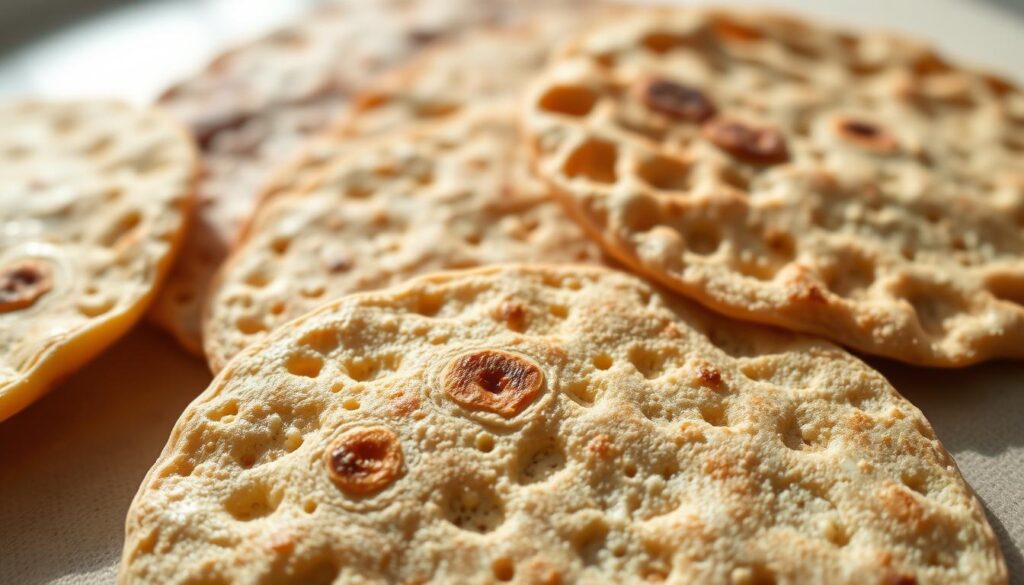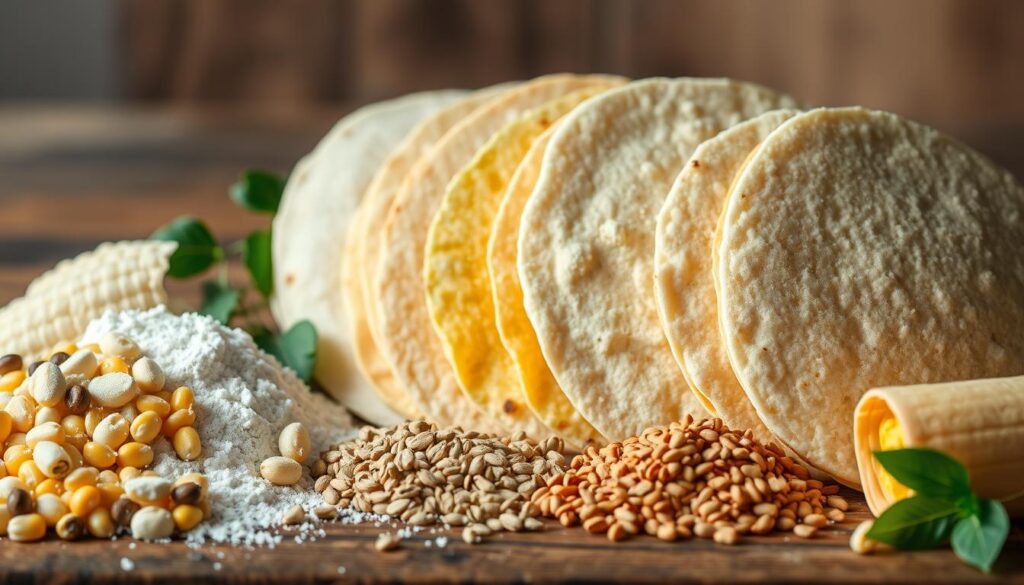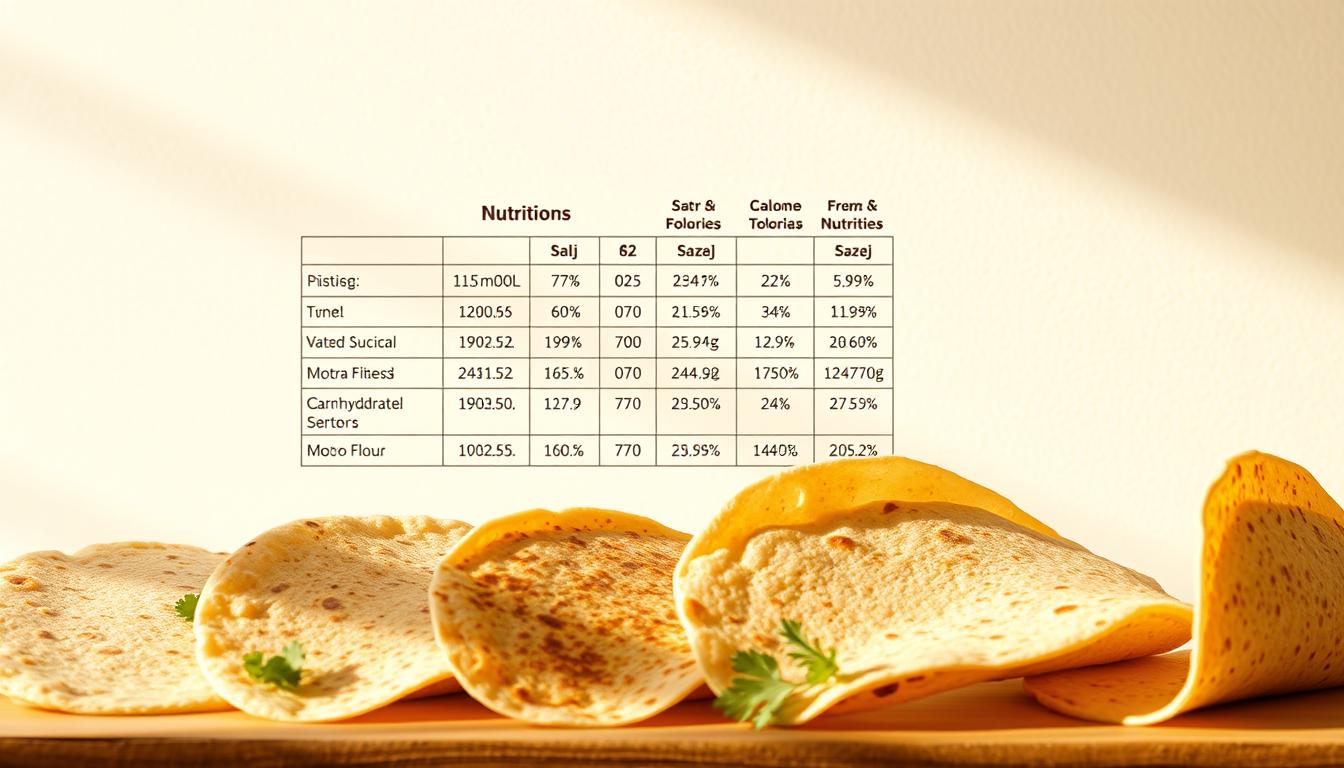Table of Contents
Imagine you’re at the grocery store, looking at tortillas. You’re deciding between corn and flour, whole grain or gluten-free. Each choice affects taste, tradition, and health.
Tortillas are more than just wraps for tacos. They connect culture and nutrition. But how do you choose the best one? This article explores what’s in those wraps, from corn’s simplicity to whole wheat’s fiber boost. Let’s see how tortilla ingredients impact your meals and health.
Key Takeaways
- Traditional tortillas vary widely in calories and carbs depending on ingredients.
- Corn tortillas often have fewer calories than flour options.
- Whole grain versions boost fiber and protein compared to refined flour.
- Understanding tortilla nutrition helps align choices with dietary goals.
- Ingredients like corn, wheat, or ancient grains define nutritional benefits.
Understanding Tortilla Nutrition Basics
Choosing the right tortilla starts with knowing its ingredients, nutritional values, and serving sizes. These details help you make choices that fit your health goals.
Traditional Tortilla Ingredients
Corn tortillas are made from corn masa, water, and lime (calcium hydroxide) for texture. Flour tortillas use wheat flour, water, and sometimes oil or leavening agents. Specialty options like whole-grain or ancient grain blends may add fiber or protein.
Nutritional Profile Overview
Average tortilla nutrition varies by type. Corn tortillas are low-fat with 50–70 calories for a 6-inch size. Flour versions have 110–130 calories and more protein. Always check labels for added oils or sugars that boost calories or carbs.
Serving Sizes and Portion Considerations
Manufacturers list standard tortilla serving size as one tortilla, but sizes matter. A 6-inch corn tortilla is 1 serving; larger options (like 10-inch) double calories. Restaurants often use oversized tortillas, so track portions when eating out.
- Check packaging for tortilla nutrition facts per serving
- Compare 6-inch vs. 8-inch options to match calorie needs
- Pair tortillas with veggies or lean proteins to balance meals
Different Types of Tortillas and Their Nutritional Profiles
Choosing the right tortilla starts with knowing how tortilla ingredients affect their nutrition. Each type, from classic to specialty, has its own benefits. Let’s explore the differences:

- Corn Tortillas: Made from masa or corn flour, these have 10–15g tortilla carbs per serving. They are lighter in calories and packed with fiber and minerals like magnesium.
- Flour Tortillas: These are softer and more pliable, with 20–25g tortilla carbs. Many are enriched with iron and B vitamins for extra nutrition.
- Whole Wheat Options: These are higher in fiber and protein, with 15–18g carbs. Choose 100% whole wheat for better digestion.
- Vegetable-Infused: Tortillas with spinach or tomato add vitamins A and C. Always check labels to avoid added sugars.
- Alternative Grains: Tortillas made with quinoa or amaranth offer protein and fiber. These tortilla ingredients bring unique textures and nutrients.
Specialty tortillas like gluten-free (made with rice or almond flour) or low-carb (coconut flour) reduce carbs or allergens. Sprouted grain tortillas increase digestibility and protein. Always read labels to compare tortilla carbs and ingredients. Your choice should match your dietary goals, like fiber, protein, or specific dietary needs. Choose ones that balance taste with nutrition.
Caloric Content: How Tortillas Fit Into Your Diet
Understanding tortilla calories is key to managing your daily intake. Let’s explore how type, cooking, and alternatives affect your choices.
Corn vs. Flour Tortilla Calories
Corn tortillas have 50–70 calories each. Flour tortillas, on the other hand, have 120–150 calories. Corn tortillas use masa flour with less fat. Flour tortillas might include oils or sugars. Choose corn if you’re watching tortilla calories closely.
How Preparation Methods Affect Calorie Content
Cooking methods matter:
- Frying: Adds oil, increasing calories by 30–50 per tortilla.
- Grilling/Toasting: No oil, keeping calories the same.
- Stuffing: Fillings like cheese or meats add calories. Opt for veggies for lighter options.
Use dry-heat methods to stay on track with tortilla nutrition goals.
Calorie Comparison with Other Bread Products
Here’s how tortillas compare to other breads:
- Flour tortilla: 140 calories vs. white bread (70 calories/slice).
- Corn tortilla: 60 calories vs. a whole-wheat wrap (120 calories).
- Naan bread: 200+ calories—twice the calories of corn tortillas.
Opt for tortillas as a balanced choice for tortilla nutrition and portion control.
Carbohydrates in Tortillas: What You Need to Know
Learning about tortilla carbs begins with their types. Most tortillas have complex carbs from corn or wheat flour. But, how they’re made changes their effect on us.
Corn tortillas made the old way keep more fiber. This means they have fewer net carbs. But, the new, mass-made tortillas often have added sugars or refined flours. This increases their simple carb content.

The glycemic index (GI) is key for controlling blood sugar. Corn tortillas have a low GI of 46, unlike white flour ones with a GI of 68.3). Choosing whole-grain tortillas helps digest them slower and keeps energy steady.
Look at labels for “tortilla nutrition” info. It shows total carbs minus fiber as net carbs. For example, a 60g corn tortilla has about 16g net carbs after fiber is subtracted.
- Low-carb swaps: Almond flour tortillas (9g net carbs) or lettuce wraps cut carbs by 50%.
- Processing tips: Steaming vs. frying preserves natural fiber, lowering glycemic load.
- Meal pairing: Add fats (avocado) or protein to slow carb absorption.
Go for tortillas with at least 2g fiber per serving. Compare brands like Mission Whole Grain (15g net carbs) versus La Tortilla Factory’s corn (14g). Opt for the least processed options for better tortilla nutrition.
Protein and Fiber Content in Various Tortillas
Choosing tortillas with more tortilla protein content and tortilla fiber boosts nutrition without losing flavor. Here’s how to read labels and pick better options.
Protein Sources in Traditional Tortillas
Corn tortillas get protein from nixtamalized corn. Flour tortillas get it from wheat gluten. Both have about 3–5g of protein per serving. But, how they’re made matters a lot.
Ancient methods like nixtamalization make corn’s protein easier for our bodies to use.
Fiber Benefits and Content Variations
Whole grain tortillas have up to 4g of tortilla fiber per serving. Flaxseed in tortillas helps with digestion. Corn’s fiber helps control blood sugar levels.
Choose brands that list “whole grain” first.
How to Choose Higher Protein and Fiber Options
Compare labels to find tortillas with:
- At least 3g protein and 3g fiber per serving
- Ingredients like quinoa, chia, or psyllium husk
- Certifications like “high fiber” or “good source of protein”
| Brand | Protein (g) | Fiber (g) | Key Ingredients |
|---|---|---|---|
| La Tortilla Factory High Fiber | 3 | 5 | Whole grain corn, flaxseed |
| Mission Whole Grain | 4 | 4 | Whole wheat, oats |
| Tía Rosa Whole Wheat | 5 | 3 | Whole wheat flour, quinoa |
Always check the ingredients list first. Real gains come from whole grains and added seeds, not additives. Look for brands that clearly list fiber and protein on their packaging.
Essential Vitamins and Minerals Found in Tortillas
Corn and flour tortillas add important tortilla vitamins and tortilla minerals to your meals. The types of nutrients vary based on the ingredients and how they’re made. For example, corn tortillas go through a special process called nixtamalization.
Corn tortillas are full of B vitamins like niacin, B5, and B6. These vitamins help your body use energy. The nixtamalization process, which uses lime, also helps your body absorb more calcium. This makes corn tortillas a great source of calcium.
Flour tortillas, on the other hand, often have added nutrients. Brands may add B vitamins like thiamin and riboflavin to the flour. Iron is also found in flour tortillas, thanks to enriched wheat.
| Type | Vitamins | Minerals |
|---|---|---|
| Corn | B3 (niacin), B5, B6 | Calcium, magnesium, phosphorus |
| Flour | Added B vitamins (thiamin, riboflavin) | Iron, smaller amounts of magnesium |
Choosing whole grain tortillas gives you more tortilla minerals and vitamins. Look for “whole corn” or “enriched flour” on the label. This ensures you get the most nutrients. Also, pick brands with less sodium and sugar to keep the natural goodness.
Health Benefits of Incorporating Tortillas in Your Diet
Choosing tortillas for a balanced diet reveals their health perks. Science and tradition show how tortillas support wellness. By picking the right types, you can get more nutrients and enjoy this food.
Whole Grain Tortilla Advantages
Whole grain tortillas are packed with fiber and nutrients. They may cut heart disease risk by 20-30%, the American Heart Association says. Look for ones with at least 3g fiber per serving. They offer:
- Lowered cholesterol levels from soluble fiber
- Improved blood sugar control for diabetes management
- Antioxidant content in heirloom corn varieties
Cultural Significance and Nutritional Wisdom
Traditional corn tortillas get a nutritional boost from nixtamalization. This process makes calcium and nutrients like niacin more available. It’s a centuries-old method that modern corn tortillas often lack.
| Tortilla Type | Key Benefits |
|---|---|
| Nixtamalized Corn | Improved mineral absorption |
| Whole Wheat | Higher protein and fiber |
| Bean-Based | Plant-based protein and iron |
Supporting Digestive Health with the Right Tortillas
Fiber-rich tortillas like quinoa or spelt feed good bacteria in your gut. Choose:
- Unbleached whole grain options
- Unprocessed bean flour blends
Pair them with probiotic-rich toppings like yogurt-based salsas for better gut health.
Potential Dietary Concerns and Alternatives
Tortillas are versatile, but some dietary concerns need attention. Knowing about tortilla nutrition and tortilla ingredients helps make better choices.

Gluten is a big deal: corn tortillas are gluten-free, but wheat ones have it. If you’re gluten-sensitive, go for Siete (almond flour) or Mission corn tortillas. Many store-bought tortillas have too much sodium, over 100mg per serving. For less sodium, try Bob’s Red Mill or make your own.
- Preservatives like calcium propionate keep tortillas fresh but can cause issues. Look for “no preservatives” labels.
- Most tortillas are made from GMO corn. For non-GMO, pick Three Girls Farms or Arrowhead Mills.
- Frying tortillas creates acrylamide. Baking them is a better choice to avoid this chemical.
| Type | Gluten-Free | Sodium (mg/serving) | Additives |
|---|---|---|---|
| Corn | Yes | 50-80 | None (plain) |
| Wheat | No | 150-250 | Calcium propionate |
| Gluten-Free | Yes | 90-120 | Xanthan gum |
| Whole Wheat | No | 180-220 | Vitamin C (enriched) |
Always read labels to meet your dietary needs. La Tortilla Factory has low-sodium options, and Trader Joe’s offers organic ones. Choosing whole ingredients and cooking methods boosts tortilla nutrition and safety for your diet.
The Healthiest Tortilla Options for Different Dietary Needs
Choosing the right tortilla is key to your health goals. Whether you’re watching carbs, avoiding gluten, or seeking organic options, we’ve got you covered. Let’s look at the best choices for your health.
Gluten-Free Tortilla Nutrition
For gluten-free diets, it’s important to check ingredients. Siete and Ancient Harvest use cassava, making them gluten-free. They keep the tortilla’s texture great.
Almond flour tortillas have about 15–20g carbs per serving, similar to corn. Always look for the “certified gluten-free” seal to be sure.
Low-Carb and Keto-Friendly Alternatives
For low-carb diets, almond or coconut flour tortillas are good. They have 5–10g carbs per serving. GoLo combines almond flour and psyllium husk for a great option.
Check the net carb count to fit your keto diet. Now Foods tortillas have less than 1g sugar per tortilla.
Organic and Non-Gmo Choices
Organic tortillas are made with USDA-certified ingredients. They avoid synthetic pesticides. Bob’s Red Mill and Three Bakers offer Non-GMO Project verified options.
These choices are clean and keep the traditional taste of tortillas.
| Category | Key Ingredients | Top Brands | Key Benefits |
|---|---|---|---|
| Gluten-Free | Cassava, almond flour | Siete, Ancient Harvest | 15-20g carbs, celiac-safe |
| Low-Carb | Almond flour, psyllium | GoLo, Now Foods | 5-10g net carbs |
| Organic/Non-Gmo | Certified flours | Bob’s Red Mill | No synthetic additives |
Conclusion: Making Informed Choices About Tortillas in Your Diet
Your choice of tortilla can greatly affect your diet. Corn, whole wheat, or gluten-free tortillas each have their own benefits. Look for whole grains or added fiber to get the most health benefits.
Check labels for ingredients like quinoa or almond flour. These can help meet specific dietary needs.
Pair tortillas with foods like beans, avocado, or grilled veggies. This balances your meals. Choose 6-8 inch tortillas to keep carbs in check. New tortillas have probiotics or low-GI flours for better nutrition.
By picking tortillas wisely, they can help you reach your dietary goals. Use this guide to compare different tortillas. Choosing whole grain tortillas over white flour can make a big difference. Making smart choices can lead to healthier eating habits.
FAQ
What are the main ingredients in tortillas?
Tortillas are made from corn or wheat flour. Corn tortillas use masa harina and water. Flour tortillas have wheat flour, water, and sometimes lard or oil. Some may have extra ingredients for taste or nutrition.
How many calories are in a standard tortilla?
Tortilla calories vary by type. Corn tortillas have about 50-60 calories. Flour tortillas have 90 to 150 calories, depending on size and recipe. Always check the packaging for exact calorie counts.
What is the carbohydrate content in tortillas?
Tortillas get their carbs from grains. Corn tortillas have 12-15 grams of carbs. Flour tortillas have 15-30 grams, depending on size. Look for lower-carb options if watching carbs.
Are there any health benefits to eating tortillas?
Yes, tortillas can be healthy, mainly when made from whole grains. Whole grain tortillas are full of fiber, which aids digestion and may help with weight. They also have B vitamins, iron, and magnesium, boosting overall health.
What types of tortillas are best for a gluten-free diet?
Corn tortillas are great for a gluten-free diet as they are naturally gluten-free. There are also gluten-free tortillas made from almond flour, cassava flour, and coconut flour. Always check labels for gluten-free certification.
How does the fiber content in tortillas affect digestion?
Fiber in tortillas, like in whole grain varieties, is key for digestion. It helps with regular bowel movements, reduces constipation risk, and keeps the gut healthy. Choosing fiber-rich tortillas can boost these benefits.
How should I choose the healthiest tortillas?
Choose whole grain tortillas for more fiber and protein. Look for minimal additives and preservatives. Opt for organic and non-GMO for better nutrients and fewer chemicals. Reading labels carefully helps make good choices.
What are some alternatives to traditional tortillas for a low-carb diet?
For a low-carb diet, try tortillas made from almond flour, coconut flour, or with high fiber ingredients like psyllium husk. These options have lower carbs but still satisfy as wraps or bases for meals.

